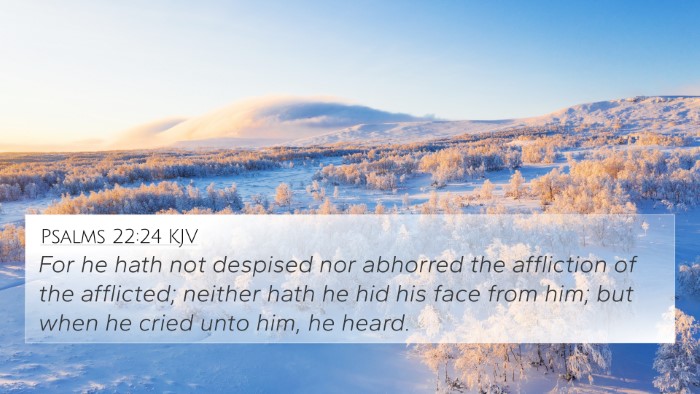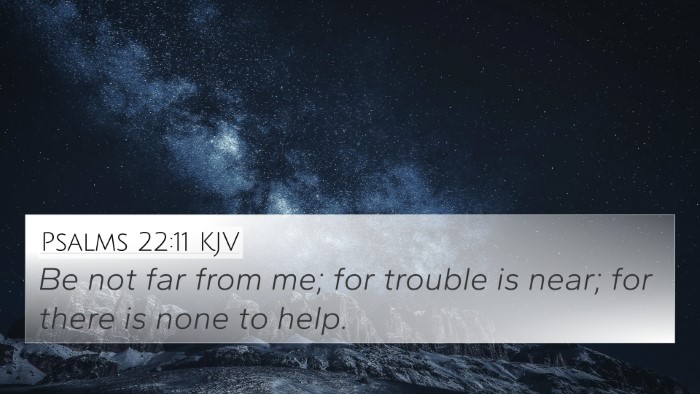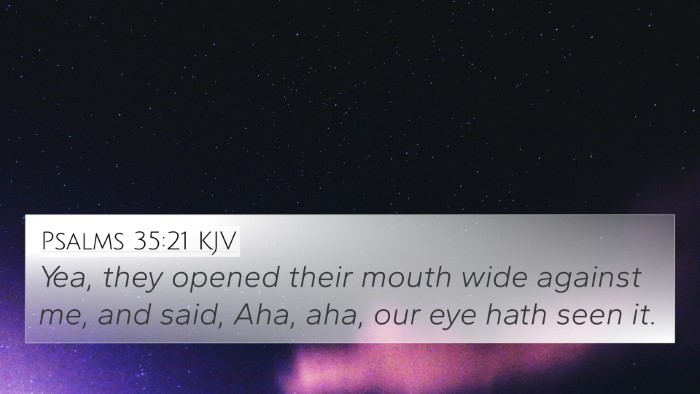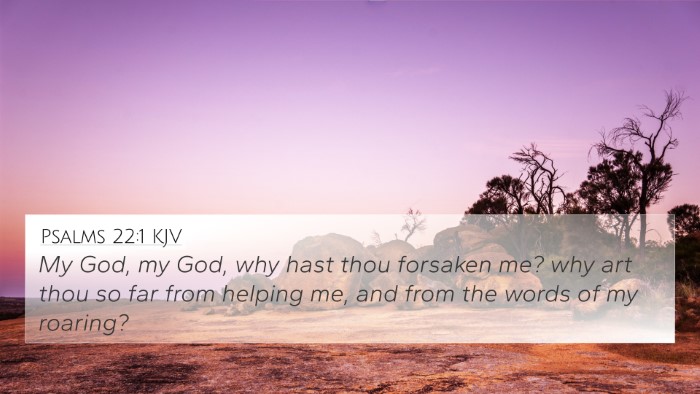Psalms 38:21 - Meaning and Interpretation
Psalms 38:21: "Forsake me not, O Lord: O my God, be not far from me."
This poignant plea from the psalmist expresses a profound feeling of abandonment and a deep desire for divine presence and help during times of distress. Let's explore the implications and meanings derived from this verse through a comparative lens using public domain commentaries.
Contextual Understanding
The psalm is categorized as a penitential Psalm, often associated with sorrow over sin and a cry for God's mercy. The psalmist experiences profound anguish, likely due to personal sins or health issues. This context is critical to understanding the urgency of their plea in verse 21.
Insights from Commentaries
-
Matthew Henry:
Henry emphasizes the relational aspect of the plea, noting that the psalmist recognizes God’s proximity and care as vital to endurance in suffering. It’s a call for God to remain near, reflecting the theme through the Psalms where feelings of forsakenness prelude God's deliverance.
-
Albert Barnes:
Barnes discusses the significance of calling upon God. He identifies this verse as a point of deep humility and recognition of human helplessness. By beseeching God to not be far away, the psalmist acknowledges both a personal account of sin and the need for divine closeness.
-
Adam Clarke:
Clarke highlights the universal despair in feeling abandoned. He connects this plea with the suffering of the righteous throughout scripture, implying a shared human experience of seeking divine support in trials. Clarke also suggests a broader theological understanding of God’s ever-present help amid adversity.
Bible Verse Cross-References
This verse stands in connection with various other scriptures that explore themes of abandonment and divine presence. Notable cross-references include:
- Psalm 22:1 - "My God, my God, why have you forsaken me?"
- Psalm 139:7-10 - "Where can I go from your Spirit? Where can I flee from your presence?"
- Hebrews 13:5 - "Never will I leave you; never will I forsake you."
- Isaiah 41:10 - "Fear not, for I am with you..."
- Romans 8:38-39 - "Nothing can separate us from the love of God..."
- Matthew 28:20 - "I am with you always, to the end of the age."
- 2 Corinthians 12:9 - "...My grace is sufficient for you, for my power is made perfect in weakness."
Thematic Connections
Through this verse and its cross-references, we delve into a deeper exploration of themes such as:
- Theological Presence: Emphasizing the immutability of God’s presence amidst human feelings of alienation.
- Human Condition: Exploring the universal struggles of humanity in seeking solace and support from God.
- Repentance and Restoration: Understanding the importance of acknowledging one's sin as a precursor to divine assistance.
Links Between Old and New Testament
Highlighting the connectivity between Scripture, the themes in Psalms 38:21 resonate vividly in New Testament teachings, particularly regarding God's faithfulness to His people during trials. The repeated assurances of God's presence in both Testaments reveal a consistent divine character, elevating this verse to a broader narrative of hope and salvation.
The Role of Cross-Referencing
Utilizing tools for Bible cross-referencing can greatly enhance the understanding of scripture. These tools help identify connections between verses, enabling a thematic analysis that enriches one’s study of the Bible.
For those seeking to deepen their spiritual knowledge, a Bible cross-reference guide serves as a useful resource for uncovering the intricate web of biblical relationships, encouraging believers to explore similar passages and divine principles across the texts.
Conclusion
Psalms 38:21 serves as a heartfelt reminder of our reliance on God amidst life’s struggles. Through comparative analysis and inter-Biblical dialogue, this verse invites readers to meditate on their relationship with God, explore His faithfulness, and recognize their intrinsic need for divine support. By connecting the sentiments expressed in this psalm with other Bible verses, believers can find comfort and reassurance in their spiritual journey.







